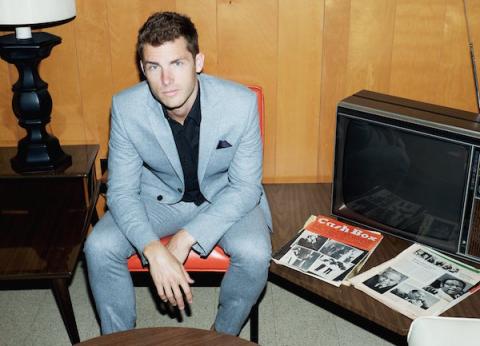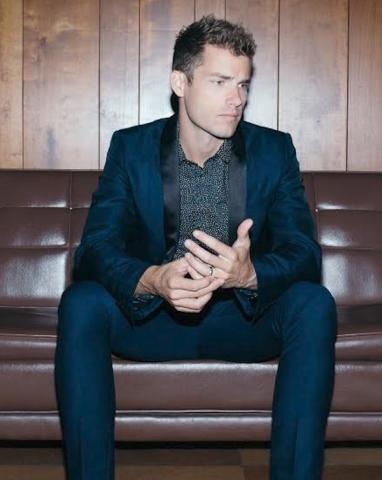
It's been a pretty rewarding life for the working singer and it's one that's about as far removed from the sweatshops and troubled workplaces in countries like Bangladesh.
When McLaughlin released his latest album Like Us this past October he decided to do some good to give back. His choice was to team up with World Vision to help in the fight to end human trafficking, the trade of humans for sexual slavery, forced labor or commercial sexual exploitation, in Bangladesh. For his part McLaughlin will be donating 100 percent of the profits from Like Us sales towards World Vision building centres in Bangladesh to protect children from trafficking, injury and neglect.
McLaughlin, who has two young daughters with his wife Amy, says he learned about human trafficking while listening to an Alec Baldwin podcast featuring Rob Morris of the Love146, an organization "working to prevent child trafficking and exploitation, care for survivors, and empower a growing movement."
McLaughlin explained Samaritanmag why he decided to team up with World Vision.
What are you doing with World Vision?
Jon McLaughlin: I am donating 100 percent of the profits from my record that came out almost two months ago. The record's called Like Us, so we've been on the Like Us tour since October. It's been amazing. We've never really done anything like this before. We've worked with other organizations in the past. Also I've never done something with human trafficking, which is something I've been thinking about over the last couple years. I wanted to get involved somehow with that.
Everybody at the show if they buy the record 100 per cent of the profits go towards building faith houses in Bangladesh for human trafficking victims.
A hundred percent of the money is a big dent out of the pocket of any touring musician. What made you decide to make that commitment?
The short answer is we're not swimming in money by any means, but it's all relative and compared to most of the world we are swimming in money. It's sort of one of those things where you want to make a difference and when you start getting into the nuts and bolts of it where you've got to draw a line somewhere and decide how much you're going to give it just felt right when we were talking about it. I was going, "We can give 50 percent, or we can give 60 per cent." Then I was just like, "Well, let's just give the whole thing." Let's make as big of a difference as we can when we're out on the road.
You mentioned that the funds you're generating will be used to combat human trafficking. Was there a specific story that inspired you to do this?
Yeah, I was actually listening to a podcast; Alec Baldwin has a podcast called Here's The Thing where he just interviews all kinds of people. I was driving home from Nashville to Indianapolis and I was listening to this podcast. It was an interview with Rob Morris, who started an organization called Love146. This interview was just heart-wrenching, and my wife and I had just had our first daughter Luca. Luca's two now so she was just born, maybe two months old, and I think the combination of the reality of what this guy was talking about in this interview and also being a new dad and seeing the whole issue through that lens, when I got home and I went to Amy, my wife, "You got to listen to this interview. You won't believe this stuff is happening." It's one of those things where you knew, you read things here and there, you knew this awful reality was going on in the world, but it's so in-the-dark when you're not faced with it day-to-day.
The podcast you listened to, was it specifically about human trafficking in Bangladesh?
No, a lot of how Love146 started out was in South East Asian. The Bangladesh tie came when I met with my contact at World Vision this summer and I basically said to him, "Look, I want to do something with human trafficking, you tell me what would be the most helpful thing to do." I didn't want to do this thing where I go, "I'm gonna raise money to dig a well" and for the people who know what is needed and working in the trenches every day they're like, "That's actually not helpful at all; you're wasting your money." So I said, "This is what we're gonna do. We're gonna donate all the profits from this record. We're gonna try to sell as many copies of this record as we can. But going in, tell me, so I can tell people going in what the money's going towards, and what would be the best thing to do." And this is what they said they thought would be the best thing.
In doing this have you become more educated about child labour, foreign working conditions, that sort of thing?
A little bit. It's one of those things where the more you learn, the more you realize how complicated the issue is. It's similar in the complexity toward prostitution or something like that. Hollywood gives prostitution this black and white kind of scenario and you realize that it can be much more masked. Some human trafficking victims, they're right under our noses a lot of time because you don't know they're victims. They could be cleaning houses in Nashville, Tennessee and you don't know their story. And the more that I do learn the more I realize what a big task it is to undertake abolishing the issue altogether.
When you say words like "human trafficking" and child labour and slavery, people get the impression of sweatshop workers chained to a box, but quite often these chains are economic; there's sinister manipulation going on that's not physical.
And a lot of the victims in Bangladesh are actually sold into slavery by their own families. It really gets into just poverty. Lack of education and poverty are sort of the common themes around all the of the situations you read about is what I've discovered.
Has learning about this stuff affected you as a consumer at all? For example, do you check where things are manufactured before you buy things?
A little bit. I think about it more when we travel. We travel a lot obviously, and when I'm in a motel with the maid service or something, or when we were in Vegas not too long ago and the people on the street handing out cards for clubs and stuff like that. I'm not sure I can spot things because I don't have any actual experience in the field like detective work or anything like that, but I don't know, I'm at that point where I'm looking around at people in the service industry as a whole, because I know that's the industry where a lot of victims are forced into this forced labour; I'm kind of looking at people suspiciously now.
But in terms of consumption and where you buy your clothes, where are your clothes coming from all that kind of stuff, that fortunately is a trendy thing right now, as it should be, but knowing about that predated this whole project with human trafficking.
Did having two young daughters incentivize you to be more aggressive in being giving and supportive?
Yeah, if I listen to that initial interview it was just so mind-blowing that I'm sure I would have had the same reaction whether I would have had my first child or not. But having children definitely makes it a little more tangible than this one story that Rob Morris talked about in this interview. In my mind it's this little Luca, my daughter. So it just makes it a little more real for sure.
Has doing this changed the music you're making, your performances or your vision for what music you'd like to make in the future at all?
I don't know that it has affected the music yet, because we started this project right after we finished my latest album and go in cycles in writing. But it affects the way I see touring a little bit when I get on stage, I see that more as an opportunity and a platform to do some good and let the audience and the fans who've been with me for years now to let them in on the project. It sounds a little corny, but it feels like something we're doing together. And now that I've been doing it for so long you get a little more comfortable with the platform and you start to bring in your own ideas and your own goals into that world. I think it's going to affect my music in the future, for sure. Any big part of my life always finds its way into the music.
nike air overlook apartments Retro High OG Wmns "Panda" CD0461-007 Women/Men Super Deals, Price: $98.03 - Air Jordan Shoes